1-9-17
Truth in Packaging: Isabelle Huppert Talks about Elle
By Diane Sippl
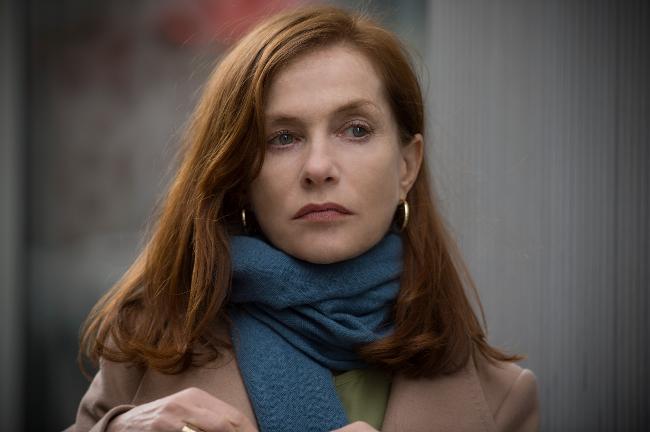
Beginning her film career with French directors Blier, Tavernier, and Goretta and then soundly establishing herself across genres with Chabrol, Isabelle Huppert has always been a stand-out in French cinema. She has done some of her best work for Pialat, Godard, Chereau, and Ozon but has also won awards under such international directors as Haneke and has worked with the best of auteurs from Italy, Poland, and Korea and with a number of American independent directors. Recently, especially with Paul Verhoeven in Elle, she has been noted as an “acting auteur” in her own right, commanding the performance as she does with little guidance from the director.
Touted over the years from Cannes, Venice, and Berlin to Moscow, Seoul, Cairo, Montreal, Stockholm, New York, and San Sebastián, where she has won either Best Actress or Lifetime Achievement Awards, Isabelle Huppert has often been deemed the most gifted actress in the world today. She is arguably the most prolific. With 131 credits already for acting in film and television alone since 1971, she will soon appear in six new films currently in post-production. She also works on the international stage in theatre, for which she was trained, from Europe to the U.S. to Australia, performing works by Euripides, Shakespeare, Ibsen, Genet, Coetzee.
Since Elle opened in Los Angeles at the 2016 AFI FEST presented by Audi, Elle, France’s submission for the Best Foreign Language Film Oscar at the Academy Awards has won the same award at the Golden Globes where its lead, Isabelle Huppert, has also won the award for Best Actress in a Motion Picture Drama. Significantly, in her acceptance speech, she reminded her peers who were present and also viewers world-wide that cinema is a cross-cultural art: “Thank you for making me win in a French film directed by a Dutch director here in America… There are people from all over the world here in this room, from China to the Arabic world, from America to Europe. Do not expect cinema to set up walls and borders.”
As an actress, ever since The Lacemaker, Isabelle Huppert’s opacity has ushered in mystery and unpredictability. In more recent films such as Special Treatment, Copacabana, and In Another Country, her uncanny sense of irony is played for humor and gestures of self-styled wit. While her quiet reserve can secretly harbor doubt, fear, and pain, she is perhaps more readily known for showing us the very definition of nonchalance and insouciance. Her candor and ruthlessness in Elle arrive with a dozen other facets of her character and keep us guessing from moment to moment what it is that makes her “tick.”
The following is the transcript of an interview, edited by KINOCaviar, that was conducted by a roundtable of Los Angeles-based members of the press in Beverly Hills the morning after Isabelle Huppert was honored at the AFI FEST with a Special Tribute and where her latest films, Elle and Things to Come, were screened for the public. General questions are indicated by RT (Round Table), KINOCaviar questions are indicated by KC, and Isabelle Huppert’s responses are indicated by IH. All photos are from Elle by Paul Verhoeven.
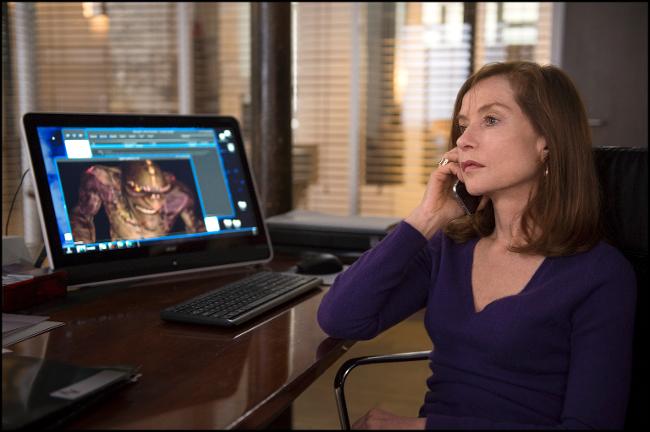
Background
RT Regarding The Piano Player, where you went – you are going for it, you are really going for it. Is it in your nature? Is it hard
IH No, I don’t see any problems going there. For me it’s maybe easier going there than to go probably to simpler characters. I think it’s easier to do characters like this, with so much complexity and ambiguity, and I think also the camera allows you to say so many contradictory things at the same time. And I like also when it actually plunges into the most complex and debatable situations and yet you still have this possibility to end up with a certain idea of how innocent, in a way, and fragile is the character, including Michèle, in a way, at the end. You feel like she got rid of so many things during that story. All that initial tragedy that she carries from her childhood is probably determining the way she relates to violence and to that violence that happens to her. But of course not everybody having been through what she went through would react necessarily in the same way, but I like the way that – yes – it’s something that I understand. It might be also the way I react to my own roles myself, to say, ‘Okay, no big deal…’ and that’s the way she reacts to what happens to her. And it doesn’t mean that it’s not a big deal. I mean, of course, obviously it’s not to say that the rape is not to be considered as an unacceptable thing. Of course it is unacceptable.
But that story in particular is interesting because it can be taken as a fantasy – as a fairy tale, almost, a black, dark, fairy tale – but it’s also realistic, so that’s how the film is disturbing, in a way. But the way she reacts to that event of course has to be understood, or to be guessed – that’s also what I like about the film, you can only guess what happens to her, you can only guess what took her from the initial tragedy that she had carried all her life to the woman she is, being fearless, strong, solitary, ruthless, manipulative but still fragile – I love the way she takes care of the little bird, for example, and that moment for me is really interesting.
And so all along the film you have all these moments. They’re very disturbing: the way she hates her mother but still loves her; she doesn’t think much of her son but of course she still loves him. I think it’s so real, you know, how you relate to people most of the time. You can have negative feelings for people but still love them. That’s very human.
RT To piggyback off that, to be able to go there, under the direction of someone who gave us one of the classic thrillers, Basic Instinct, Paul Verhoeven, how was that for you, the experience?
IH Well I always admired Paul Verhoeven immensely. The first film I saw by him was Turkish Delight, when I was still in school, and the film always remained stuck in my mind, from the beginning. I think he’s really a great, great director the way he blends different kinds of films, going from the Hitchcock thriller to the psychological portrait of a woman and, of course I read everywhere that the film is a comedy – I would say it’s also a comedy, I wouldn’t say it’s only a comedy. I love the way he makes people feel so unstable, because he never remains in one category. He really takes you everywhere, and in the end – well, it’s almost like a roller coaster, but you have a beautiful view! And a true one, also, to what human beings are, I think.
I think he’s really interesting because he seems to be ironical and not to care, but in fact he cares a lot. Even if you take a film like Black Book – she’s a Resistor and she’s sleeping with this Nazi man and everything – in the end he forces you to look at people maybe the way they are and not the way most of the time people pretend they are.
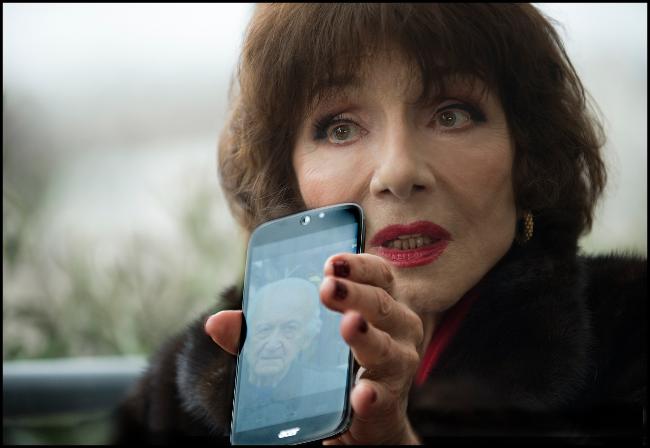
RT Didn’t the writer write the book, Oh… with you in mind?
IH That’s what he said, you know, because I met Philippe Djian first. I read the book, and then I wanted to meet him and tell him, because I wanted to get involved into the production of the film, and finally we went to Saïd Ben Saïd, the French producer, and he had this ingenious idea to ask Verhoeven to do the film. But when I first met Philippe with the book – I had met him before, I knew Philippe from before – yes, he said that. He said, ‘You know, I had you in mind when I wrote the book.’ I thought, ‘Oh? That’s funny…’ I don’t know.
RT So what did you think about that? Has that happened before, where an author or a writer has said, ‘I was thinking of you for the script’? And how do you feel about that added responsibility?
IH Well I didn’t take it as a responsibility. No, I just thought he might be inspired by some of the characters I did before. An actress is always related to what she did. He didn’t know me personally. I think he meant from the previous characters I had done before. So I didn’t think much of it, neither responsible or un-responsible. I thought, ‘Why not?’
Michèle
RT So this character, Michèle, she was originally written by Philippe Djian and then she was adapted for the screen by another man, David Birke. Has he brought a sort of feminine perspective to the role? And if so, what was that?
IH Yes, recently I thought that she was almost like – not almost – or maybe I read somewhere – that she could be taken as a post-feminist character, and I like this definition of the character. Obviously she’s not a victim; that’s for sure, so for that she’s a feminist character. But she does not also fall into the caricature of the avenger, shooting the guy, and taking the gun, you know, more like the woman wants to take the tools of the man, to take vengeance. She’s beyond that. She doesn’t have to go through all these devices. So I like the post-feminist character. She has already all the strength in herself, in a way, to be more than a feminist character.
But of course, yes, she doesn’t want to be a victim, and she wants to take control of what happens to her, but in a very unpredictable way. She’s very brave, but it’s almost like she wants – she’s seeking something, from the beginning when that happens to her. She understands that she’s intrigued more than anything else. I think she’s intrigued. She wants to understand something about violence, or so. And her willingness to understand that violence makes her stronger than the violence itself. In a way that’s how she remains untouched by the violence, because she wants to understand where the violence comes from. And she might want to understand where the initial violence that she has been confronted with as a child came from.
So she wants to do that experience, and of course it doesn’t go in any case with any kind of – I like the way that she remains completely unemotional, even at the end. I think that the real amorality to the story (sometimes I can hear that the movie could sound amoral) was if she had elicited emotion to the fact. It would mean that she had a kind of affective relation to the man. But that’s not what it is, you know. It’s completely different. It’s more about being willing to understand that violence. Of course the disturbing part of it is that what comes across also is sexuality, and desire, so you can imagine that there is a link or so between violence and desire and things like this, but again, it doesn’t emotionally touch her. It’s not that she fell in love with the man. I mean, by no means. It’s a lot more complex than this, I think.
RT And also at the end, the scene when the wife thanks her, is such an unusual…
IH Ya – because not only she wanted to investigate that violence and that man’s psyche, but then she finds out that the Catholic woman, also she had understood what her husband went through, so it’s even more disturbing at that point.
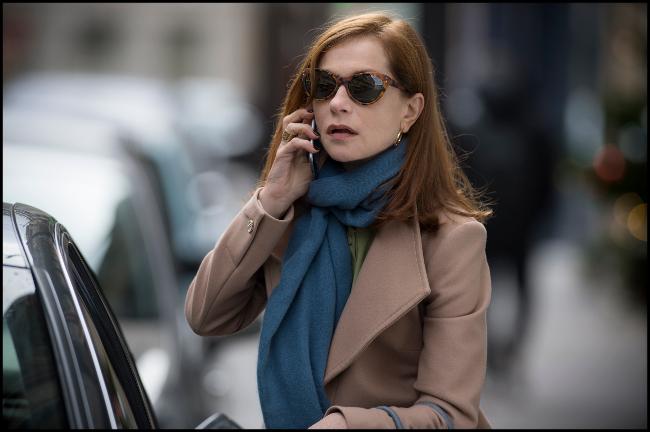
KC So it’s not that she’s trying to re-run something that happened between her father and her, personally. I couldn’t understand if her father ever attacked her, if she was a direct victim of his violence, or just watching all the murders
IH No, I don’t think so – no, no, she was just watching the murders, and then she found herself, as a little girl – because that’s what she says at Christmas when she tells her neighbor of how this whole story went and she recalls how she was almost an unwilling accomplice to her father because she was witnessing him tearing the curtains down and putting the fire to the house. That doesn’t make her an accomplice to her father, but she witnessed that with him, and I think that as she grew as an adult she wished probably she could have reacted to that, but she was eight years old. How can you react to that?
That’s maybe why she has no guilt, because she has so much guilt about that, so any other guilt she could have, for example, for sleeping with her best friend’s husband, is so little compared to the guilt that she could have from that initial time. But also, again, that’s all more guessing than real Freudian explanations. It’s more blurred than this, I think.
KC So some people would say that she’s a masochist, that she allows this violence to come from the man in the end and even brings it on when she’s in the cellar with him because she grew up with a masochistic tendency because of exposure to her father.
IH I wouldn’t call her a masochistic person. I think that’s a short way – a shortcut, in a way, to call her a masochistic person. I think, again, it’s more complex than this. Even though – yes, I admit that the fourth rape, in the cellar, almost ends up like a kind of orgasm, but she’s alone when it happens. He has left already. It doesn’t happen with him. It happens after he leaves.
KC So it was for her to re-play that from a position of control?
IH Could be, also. Absolutely. Absolutely.
KC And can you talk about how that particular aspect might relate to the fairy tale dimension of the film?
IH Well because it’s sort of a fairy tale in the way it’s more an exploration of a fantasy, you know. It doesn’t make the movie, in any case, make a statement about anything. It’s more like – even Philippe Djian, from the beginning, kept saying, ‘let’s take it as if it’s a completely made-up story, because you only explore the most unconfessable part of a person’s psyche’. But of course I think that the disturbing thing about it again – I’m not denying it – is that it can be taken as a fairy tale but it’s so realistic on the same way. So that’s Verhoeven. And that’s Phillipe Djian.
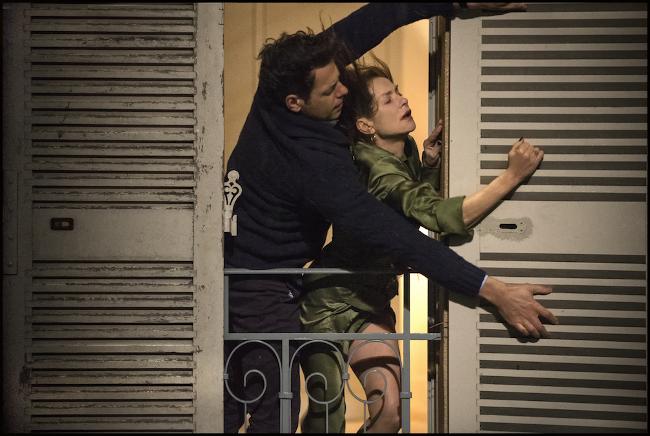
Acting
RT You are in almost every scene of this film except for the flashbacks, so I imagine you were working really long days.
IH No, no, no it’s me in the flashbacks –
RT Really?
IH Yea, of course.
RT The little girl?
IH Yea sure.
RT But for you, how was that shoot? It must have been incredibly taxing.
IH It was so great, because I was in every frame, every shot – of course, not in the counter-shots, I couldn’t be there, I’m not dubious enough to be here and there at the same time – but let’s say in every scene, every day, with everybody, I was there. It was so thrilling, because it meant that I could really – I didn’t have to make a choice, in a way. Sometimes when you have just a few scenes, it’s more difficult to be that ambiguous and that complex. But here, it was almost like a documentary.
And also, Verhoeven never said a word to me. Never. We never discussed the character. Never. Not the work. We discussed the shoes, the shirts, the clothes, which are fabulous. I mean they really tell you who she is – wealthy, and sometimes, as with the long silk skirt, so much is being said through the costume. But as for the character itself, we never discussed it. And it was wonderful, because at some point he said, ‘She’s a woman. She certainly knows more than I would do.’ And he let me take the material and shape it the way I wanted to. So that was quite an extraordinary experience.
So I never felt I was playing a character, actually. No, I rarely feel a character. I think a character is very limited – it’s very arbitrary most of the time. It’s like a big – I don’t know what it is –but it’s not the way I take it, what I do. I don’t think in terms of character. I think in terms of states, states of mind, but not a character. For me a character does not exist, actually.
KC You’ve said that the actor is like a sponge in relation to the camera and the sets and the situation, and last night you said that in playing any role, rather than being the character, you’re being yourself and imposing something of yourself on the role, instead of taking notes on the script, analyzing the character.
IH Absolutely. Yea, yea, because I don’t believe in the concept of the character. But then, it’s not contradictory to me. It’s hard to explain. For me there is no character, but then I said, I think, it’s not like I was becoming the character; it’s more like the character is becoming me. So that’s what I meant, maybe, thinking about the sponge. You absorb, also, the director’s vision, and I think everything goes from the mise-en-scène. You are defined by the way you are being filmed by the director, and that’s the best possible answer you can receive for whatever question you can have. The camera that comes at the moment, the right movement – it’s all about these two in a movie. Everything else is bullshit for me, honestly.
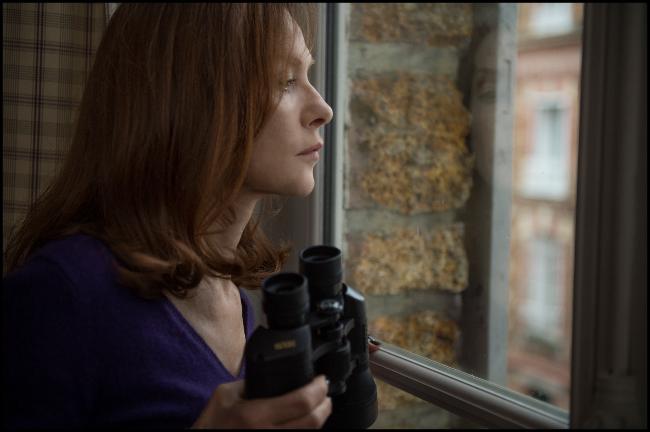
New Films
KC Then can you compare your experience in playing in Elle with your experience in playing in Things to Come by Mia Hansen-Love? The films seem to be so different.
IH Well you can compare it. It is different and then you have those funny similarities like the cat, of course. In both films you have a crazy mother, which is very different from what I am, you know. They’re all crazy mothers – one is sexually obsessed, the other one is very superficial and very crazy in Things to Come. Obviously the two characters are completely different, diverse.
But in both films I walk a lot. I keep moving around, and the body language is very important, and I think the way of walking is very similar to my own way of walking. The way you walk in a character is very essential. People don’t realize that. You have a body language for each character, which might be more or less stable. It’s something that comes very naturally to me. When I start doing a movie, it’s like someone else was growing within me – I have almost a virtual vision of someone – let’s say the character – but it’s a vision of myself like I was doing a step aside, slightly different.
I just finished that film called Madame Hyde – Mrs. Hyde, you know – it’s a crazy filmic version of Dr. Jeckel and Mr. Hyde. And I play this crazy Math teacher who becomes Mrs. Hyde at night. It’s directed by a French director called Serge Bozon with whom I did another film called Tip-Top two years ago. Hopefully it comes to this country because it’s a really interesting character. And this character was completely composed. So it was all about being very, very composed and yet very true, because no matter what you do, even if you compose a character, you still have to find a way to be real. That’s the way people relate to what you are. So it’s a very strange equilibrium-balance between being very composed and yet being very, very true. It’s like you have a vision of that, and then you do it. It’s not something that I can discuss with the director or that I can explain – it’s intuition.
RT Is the character in Things to Come more fragile, in a realistic way, than the one you play in Elle?
IH Yes. She has to face more difficult – not difficult, no, because in Elle’s case she has to face the rape and so many things – but in Things to Come, yes, she could be a victim, too. She’s being left by her husband, and the children have left the house, and the professional life is not any better because her publisher wants to put her on the side. But it’s all about how stable she stays and how strong she stays – it’s all about that, you know – and how she finds the inner resources in herself to be happy also.
She’s a philosophy teacher, and obviously – she says it – she finds fulfillment in her intellectual life. But I like also the way philosophy is being shown in the film, because philosophy is never shown as something abstract, but it’s more used as a tool to understand the world and to see how beautiful the world is sometimes, so it’s the way she uses philosophy. And it’s even funny, because when the couple separates, instead of fighting over the coffee machine, they’re gonna fight over a book, which I think is quite funny, in a way. For a change, it’s nice.
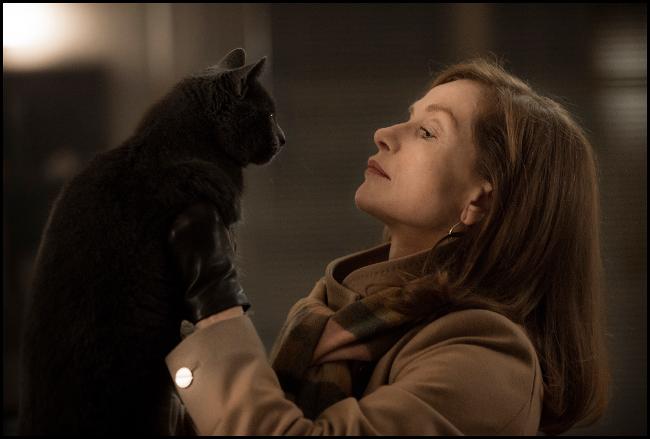
Parenting
RT Please forgive me. I was wondering if you could explain to me a part of the movie that I’m trying to understand, because I was siding with your character, Michèle, when she’s arguing with her son, ‘Look at that baby – he’s not yours.’ I was siding with Michèle – you’re being bamboozled here – but why do you think that Michèle comes to the point where she ultimately doesn’t want to fight that anymore and just accepts her son’s decision for what it is? What do you think?
IH Because at some point I think it’s very touching what happens. Obviously the baby is not the son’s baby. The baby’s black, so it’s not the son’s baby. But I like everything in that. I like the way he doesn’t want to see reality. Of course it’s not his baby. But he’s ready to like his baby no matter what, and when she understands that, it’s very touching. Because when he’s about to split from the girl and the girl has been becoming hysterical, she says, ‘Oh – it was all about the baby. You like the baby.’ And also it’s interesting because it says a lot about transmission and what it means about parenthood. He likes the baby even though it’s not his son, and in her case, she has a real son that – well, it’s interesting, the scene with the nurse outside of the hospital, because she says, ‘I always wondered how this boy could be my boy.’ So the blood ties are kind of touched in that situation, because the son likes the baby who is not his son and in her case, she says, well, of course, obviously it’s my son, but how can this boy be my son? And it says a lot about what exactly it means – blood ties – or not.
KC It’s strange that maybe he’s trying to become the good father that her father wasn’t.
IH Exactly! Exactly – absolutely, also.
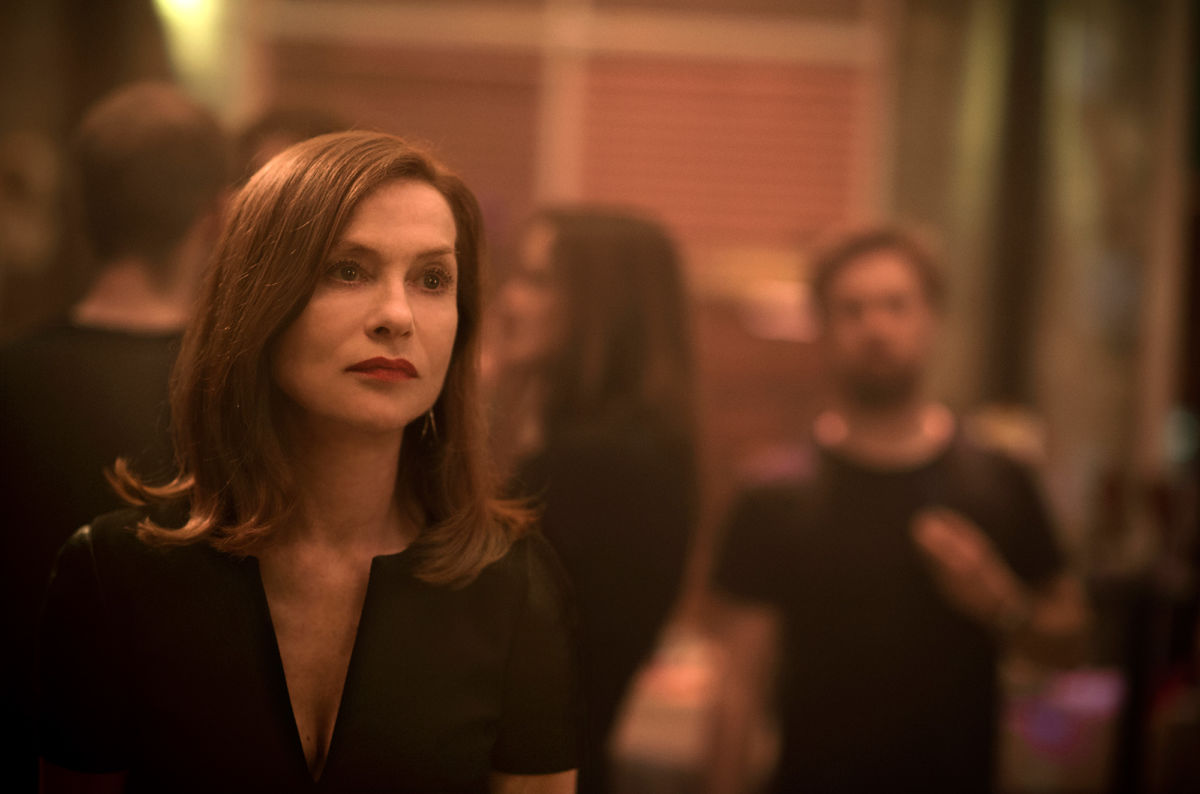
Violence
RT Switching gears a little bit, this film arrives at a really interesting time in this country. We have a President-elect who has been accused of both inappropriately touching women and inappropriately kissing them. Your film deals with a sexual assault by a man just across the way just as we’re having all these conversations about rape and sexual assault being a systemic problem in our society. So I’m wondering, what sort of conversations do you hope that viewers will have after leaving this film?
IH Well I think that, again, the film is very clear about that. I mean, there is no ambiguity – a rape is a rape and a rape is a crime, and it has to be punished as a crime. And actually, it is being punished, deeply punished, in the film, by the time you get to the end. So there is no doubt about that; there is not the least little intention to excuse.
Again that’s why – I think you are in this specific story as a fantasy. In any case, it does make a statement about how – even though she takes the rape the way she takes it, almost evenly compared to other events in her life.
It’s also what’s interesting, the way she keeps distance to the rape, because you know the father, the mother, the son – everything is kind of even in her life, in a way. But in any case, there is the least ambiguity, for me – she doesn’t say, ‘Oh, it’s just a rape.’ No, a rape is a rape, and it’s very brutal, and Verhoeven shows it as something very, very brutal that shouldn’t be excused in any case. Let’s be very clear about that. Of course. That’s also – to end up with this – when I heard that the movie was a ‘rape comedy’ – how can you do a rape comedy?! That’s why I’m saying, the film is also a comedy sometimes; it’s also very funny – but certainly not a rape comedy. You know what I mean. Let’s be very precise about that.
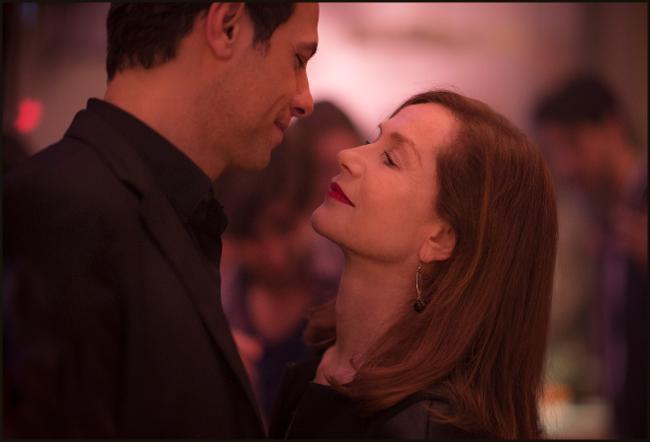
Casting
RT You seem to work consistently, probably more so than many actresses. I’m sure a lot of actresses envy the amount of work that you get. Do you find that you’re getting a lot of good scripts, or are there still some bad ones that make you go, ‘Hmm, I think I’ll pass on that one’? Do you think just simply because you have so much work that you’ve done lately that there is more good stuff coming or is there a lot of stuff you have to say no to simply because it’s not…
IH I think in any actress’ life, the good stuff is so rare, once it comes, you take it. In a way, that’s in all actresses’ lives. It’s not like you are sitting on a pile of fifty masterpieces and you say, ‘Oh, which one should I…?’ No – it doesn’t happen. You have one good thing that comes your way, and you take it.
RT And do you get a sense the initial time you read something, or how do you know that you want to do something? Do you know instinctively?
IH No, not necessarily from the very beginning. It’s all very different. It’s always a different situation whether it’s a well-known director, or a first-time director. Of course the reasons to choose the first-time director are very different from when you go for Michael Haneke, for instance, or Paul Verhoeven. Then the script is less important, the script itself or the work itself, because with a first-time director it’s more by pure intuition and instinct and of course you tend to rely more on the part itself from the script. It’s more difficult to make good choices with first-time directors. But I think I did the good ones, over the recent years, because I worked with – I don’t know if you guys know these films here – the Belgian director, Joachim Lafosse, for example. I did his first film and he turned out to be a really good director. Or this Swiss-French director called Ursula Meier with whom I did a movie called Home, that was her first film, and then she turned out to be a really major director herself.
Elle
Director: Paul Verhoeven; Producers: Saïd Ben Saïd, Michel Merkt, Thanassis Karathanos, Kate Merkt; Screenplay: David Birke; Cinematographer: Stephane Fontaine - AFC; Editor: Job ter Burg, NCE; Sound: Jean-Paul Mugel, Alexis Place, Katia Boutin; Music: Anne Dudley; Production Designer: Laurent Ott; Costume Designer: Nathalie Raoul.
Cast: Isabelle Huppert, Laurent Lafitte from the Comédie-Française, Anne Cosigny, Charles Berling, Virginie Efira, Christian Berkel, Judith Magre, Jonas Bloquet, Alice Isaaz, Vimala Pons, Raphaël Lenglet, Arthur Mazet, Lucas Prisor, Hugo Conzelmann, Stéphane Bak.
Color, 130 min. In French with English subtitles.